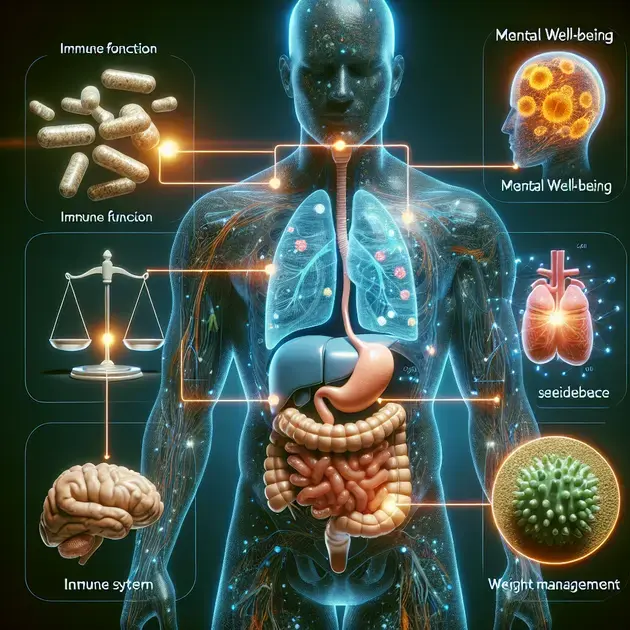Probiotics have gained significant popularity in recent years due to their perceived health benefits. In this post, we will explore the fascinating world of probiotics and their role in promoting gut health. Research has shown that probiotics can help improve digestion, boost the immune system, and even support mental health.
One of the key functions of probiotics is their ability to maintain a healthy balance of good bacteria in the gut. This delicate balance is crucial for proper digestion and overall well-being. As we delve deeper into the world of probiotics, we will uncover the various ways in which these beneficial bacteria work to support our health.

Understanding the Role of Probiotics in Gut Health
Probiotics play a crucial role in maintaining good gut health by promoting the growth of beneficial bacteria in the digestive system. These live microorganisms can be found in fermented foods such as yogurt, kefir, and sauerkraut, as well as in dietary supplements. To incorporate probiotics into your diet, consider adding yogurt with live and active cultures to your daily meals. Look for products that specifically mention the presence of probiotics on the label, ensuring you are consuming an adequate amount of these beneficial bacteria.
You can also explore online resources such as the National Center for Complementary and Integrative Health (NCCIH) website, which provides comprehensive information on probiotics and their role in gut health. By staying informed and making informed choices, you can optimize your gut health and overall well-being through the incorporation of probiotics into your daily routine.
Exploring the Health Benefits of Probiotics
Probiotics offer a wide range of health benefits beyond gut health, including improved immune function, enhanced digestion, and even potential mental health benefits. To experience these advantages, consider consuming a variety of probiotic-rich foods and beverages, such as kimchi, miso, and kombucha. Additionally, incorporating a high-quality probiotic supplement into your daily regimen can help maintain a healthy balance of gut bacteria.
For detailed information on the health benefits of probiotics, consult reputable sources such as the Mayo Clinic website, which offers extensive insights into the various ways probiotics can support your overall health. By diversifying your intake of probiotic sources and maintaining a balanced diet, you can reap the numerous advantages associated with these beneficial bacteria.
Unveiling the Mechanisms of Probiotics in Supporting Overall Well-being
The mechanisms by which probiotics support overall well-being are multifaceted and involve interactions with the immune system, gut microbiota, and various biological pathways. These beneficial bacteria can help regulate inflammation, strengthen the gut barrier, and enhance nutrient absorption, contributing to improved health outcomes. To harness the full potential of probiotics, it is essential to choose strains that are well-researched and proven effective in supporting overall well-being.
Delve into scientific studies and research papers available on platforms like PubMed to deepen your understanding of how probiotics function in promoting overall health. By staying informed about the mechanisms of probiotics and their impact on well-being, you can make informed decisions about incorporating these beneficial bacteria into your daily routine for optimal health benefits.

**Exploring the Impact of Probiotics on Immune Function**
The Role of Probiotics in Supporting Immune Function
Probiotics, known as beneficial bacteria, play a crucial role in maintaining a healthy immune system. These live microorganisms can help regulate the balance of gut bacteria, which is essential for proper immune function. Studies have shown that probiotics can enhance the production of antibodies and strengthen the body’s defense against harmful pathogens. By promoting a diverse and robust gut microbiome, probiotics can improve overall immune health.
Research on Probiotics and Immune Response
Recent research has focused on the relationship between probiotics and the immune response. One study found that certain strains of probiotics can modulate immune cells and reduce inflammation. Another study demonstrated that regular consumption of probiotics may reduce the risk of respiratory infections. These findings suggest that probiotics can have a positive impact on immune function.
Benefits of Probiotics for Immune Health
In addition to enhancing immune response, probiotics have been linked to other health benefits. Probiotic supplements or foods containing probiotics, such as yogurt and kimchi, can help maintain a balanced gut microbiome. By supporting the growth of beneficial bacteria, probiotics can improve digestion and nutrient absorption, leading to overall better health. Incorporating probiotics into a daily routine may help strengthen the immune system and promote general well-being.
Considerations for Choosing Probiotic Supplements
When selecting a probiotic supplement, it is important to consider the strain and dosage. Different strains of probiotics may have varying effects on immune function, so choosing the right strain is crucial. Additionally, the dosage of probiotics can impact their effectiveness. Consulting with a healthcare provider or nutritionist can help determine the best probiotic supplement for individual needs. Overall, incorporating probiotics into a wellness routine can have significant benefits for immune function and overall health.
Conclusion
In conclusion, probiotics can play a beneficial role in supporting immune function. By promoting a healthy gut microbiome and modulating immune response, probiotics contribute to overall immune health. Consider incorporating probiotic-rich foods or supplements into your daily routine to reap the potential benefits for your immune system.
**Investigating the Influence of Probiotics on Mental Health**
The Gut-Brain Connection and Probiotics
The gut-brain connection has gained increasing attention in recent years, with research highlighting the impact of gut health on mental well-being. Probiotics, by supporting a healthy gut microbiome, can influence brain function and potentially improve mental health. Studies have shown that the gut microbiota communicates with the brain through various pathways, including the vagus nerve and the immune system. This communication network, known as the gut-brain axis, plays a key role in regulating mood, stress response, and cognitive function.
Effects of Probiotics on Stress and Anxiety
Emerging evidence suggests that probiotics may have a positive effect on stress and anxiety levels. Certain strains of probiotics have been shown to reduce cortisol levels, the stress hormone, and modulate the body’s response to stress. By promoting a balanced and diverse gut microbiome, probiotics can help regulate the production of neurotransmitters like serotonin and GABA, which are crucial for mood regulation. Regular consumption of probiotics may contribute to a more balanced mental state and improved stress resilience.
Probiotics and Mood Regulation
Probiotics have also been linked to mood regulation and mental well-being. Studies have indicated that probiotics can impact brain function and behavior by influencing neurotransmitter levels and reducing inflammation. By supporting a healthy gut environment, probiotics may help alleviate symptoms of depression and anxiety. Furthermore, probiotics have been suggested to enhance cognitive function and memory through their effects on the gut-brain axis.
Considerations for Probiotic Supplementation for Mental Health
When considering probiotic supplementation for mental health benefits, it is important to choose high-quality products with specific strains that have been researched for their effects on the gut-brain axis. Consulting with a healthcare provider or mental health professional is advisable to determine the most suitable probiotic regimen based on individual needs. Integrating probiotics into a holistic approach to mental wellness, which includes proper nutrition, exercise, and stress management, can have a positive impact on overall mental well-being.
Conclusion
In conclusion, the influence of probiotics on mental health is an exciting area of research that holds promise for improving mood, stress resilience, and cognitive function. By supporting gut health and the gut-brain axis, probiotics may offer a natural and effective way to enhance mental well-being. Consider incorporating probiotic-rich foods or supplements into your daily routine to potentially benefit your mental health.
**Understanding the Link Between Probiotics and Weight Management**
Probiotics and Gut Health in Relation to Weight Management
The gut microbiome, composed of trillions of microorganisms, plays a crucial role in various aspects of health, including weight management. Probiotics, as beneficial bacteria, can influence the composition of the gut microbiota and contribute to metabolic processes that impact weight. Research suggests that an imbalance in the gut microbiome, known as dysbiosis, may be linked to weight gain and obesity. By promoting a diverse and healthy gut environment, probiotics can potentially support weight management efforts.
Impact of Probiotics on Metabolism and Energy Balance
Studies have explored the effects of probiotics on metabolism and energy balance, indicating that certain strains of probiotics may help regulate appetite, energy expenditure, and fat storage. Probiotics have been shown to influence genes involved in fat metabolism and inflammation, which could impact weight regulation. Additionally, probiotics may enhance the production of short-chain fatty acids, which play a role in regulating appetite and metabolism. By supporting a balanced gut microbiome, probiotics may contribute to maintaining a healthy weight.
Probiotics and Regulation of Fat Absorption
Probiotics have been implicated in the regulation of fat absorption and storage in the body. Certain strains of probiotics can help break down dietary fats and inhibit the absorption of fat in the intestines. This mechanism may prevent excess fat accumulation and promote a healthy body composition. By modulating lipid metabolism and promoting the excretion of fat through feces, probiotics can potentially aid in weight management efforts when combined with a balanced diet and regular physical activity.
Considerations for Using Probiotics for Weight Management
When incorporating probiotics into a weight management plan, it is important to choose strains that have been studied for their effects on metabolism and gut health. Probiotic supplements should be used as part of a comprehensive approach that includes a healthy diet, exercise, and lifestyle modifications. Consulting with a healthcare provider or nutritionist can help determine the most appropriate probiotic regimen for individual weight management goals. By integrating probiotics into a holistic weight management strategy, individuals may support their overall health and well-being.
Conclusion
In conclusion, the link between probiotics and weight management highlights the potential benefits of maintaining a healthy gut microbiome for controlling weight and promoting metabolic health. Probiotics offer a natural and potentially effective way to support weight management efforts by influencing metabolism, fat storage, and gut health. Consider incorporating probiotic-rich foods or supplements into your daily routine to help optimize your weight management goals.
**
Conclusion
**
Probiotics play a vital role in supporting immune function by maintaining a healthy gut microbiome and enhancing immune response. Research has shown that these beneficial bacteria can help regulate gut bacteria balance, boost antibody production, and strengthen the body’s defense against pathogens, ultimately improving overall immune health. By incorporating probiotic-rich foods or supplements into daily routines, individuals can potentially reap the benefits of a stronger immune system.
Exploring the Impact on Mental Health
The influence of probiotics on mental health is a promising area of study, with evidence suggesting positive effects on stress, anxiety, mood regulation, and cognitive function. By supporting the gut-brain axis and promoting a healthy gut microbiome, probiotics offer a natural and effective way to enhance mental well-being. Consider integrating probiotic-rich foods or supplements into daily habits to potentially improve mood, stress resilience, and cognitive performance.
Understanding the Link to Weight Management
Probiotics can contribute to weight management by influencing metabolism, energy balance, fat storage, and gut health. Studies indicate that certain probiotic strains can regulate appetite, fat metabolism, and lipid absorption, potentially aiding in weight control. By choosing probiotic supplements carefully and incorporating them into a holistic weight management plan alongside a healthy diet and exercise, individuals can support their overall health and well-being in their journey towards optimal weight management.



